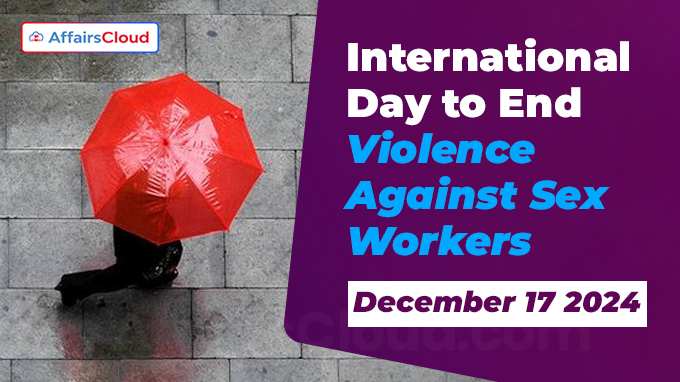 The International Day to End Violence Against Sex Workers is observed annually across the world on December 17 to raise awareness about the widespread violence, discrimination and abuse faced by sex workers worldwide and to promote equality, safety and respect for their human rights.
The International Day to End Violence Against Sex Workers is observed annually across the world on December 17 to raise awareness about the widespread violence, discrimination and abuse faced by sex workers worldwide and to promote equality, safety and respect for their human rights.
- The 21st International Day to End Violence Against Sex Workers serves as a reminder to advocate for the rights of sex workers and remember those who have lost their lives due to violence.
- The global observance of International Day to End Violence Against Sex Workers is organized by the NSWP-Global Network of Sex Work Projects.
Background:
i.The day was first observed in 2003, following the tragic deaths of 49 sex workers attributed to the “Green River Killer” in Seattle, Washington, United States of America (USA).
- The day was founded by Dr. Annie Sprinkle and the Sex Workers Outreach Project (SWOP)-USA founder Robin Few, the event began as a memorial and vigil for the victims.
- The memorial was held on the lawn of San Francisco City Hall on December 17th, 2003, the date of Ridgway’s conviction.
ii.Over time, the observance grew into an international movement, uniting sex workers and advocates worldwide to organize against violence and discrimination across the world.
Symbol:
i.The “red umbrella” has become the global symbol for sex worker rights.
- It originated in Venice, Italy in 2001 and has since been used in various events and demonstrations related to the movement.
- The International Committee on the Rights of Sex Workers in Europe (ICRSE) adopted the red umbrella as a symbol of resistance to discrimination in 2005.
ii.On December 17th, it serves as a symbol of solidarity and empowerment, reminding society of the importance of recognizing the rights and dignity of sex workers.
iii.Over time, it has grown into a global observance, with events taking place in various countries around the world.
Rights of Sex Workers:
i.Right to Safety and Dignity: Sex workers, like all individuals, deserve freedom from violence, discrimination, and exploitation, as basic human rights.
ii.Impact of Criminalization: Criminalizing sex work limits access to healthcare, safety, and social services, exacerbating vulnerability.
iii.Stigma and Isolation: Stigma associated with sex work deters individuals from seeking necessary help, increasing their exposure to abuse.
iv.Health Risks: Sex workers face higher risks of HIV and other sexually transmitted infections (STIs) due to limited access to healthcare and preventive measures.
v.Need for Decriminalization: Decriminalizing sex work promotes health, safety, and support for sex workers, enabling better access to services.
Forms of Violence Faced by Sex Workers:
- Physical Violence: This includes assaults, rapes, threats, and police brutality.
- Emotional Violence: Sex workers often experience verbal abuse, stigma, and discrimination.
- Economic Violence: Limited access to income opportunities, exploitation, and lack of financial security are key challenges.
Efforts to Combat Violence:
- Legal Reforms: Advocating for the decriminalization of sex work to reduce the vulnerability of workers.
- Institutional Accountability: Holding law enforcement and institutions accountable for any violence or abuse.
- Comprehensive Support Services: Providing health services, legal aid, and psychosocial support to empower sex workers.
- Public Awareness: Raising awareness about the issue and challenging the stigma and criminalization associated with sex work.
Status of Sex Work in India:
i.In 1956, the Government of India (GoI) passed The Immoral Traffic (Suppression) Act (SITA), which allowed Sex work under legal frames.
- Soliciting people and luring them into sexual activities was termed illegal.
- In 2022, the Supreme Court of India (SCI) recognized sex work as a profession and emphasized the rights of sex workers under Article 21 of the Constitution, ensuring their right to life and dignity.
ii.Sex work in India is primarily governed by:
- Immoral Traffic (Prevention) Act (ITPA) of 1956
- Indian Penal Code (IPC) of 1860
- Indian Constitution of 1950
- Juvenile Justice (Care and Protection of Children) (JJA) Act 2015
Global Impact:
- According to the National Crime Records Bureau (NCRB), 1,983 people were victims of human trafficking for sex work in 2022.
- In 2019, the Movement of United Professionals (MoveUP) became the first-known union in Canada to publicly support the decriminalization of sex work.
Other Global Observances:
- International Sex Worker Rights Day – March 3
- International Whore’s Day or International Sex Workers’ Day – June 2
- International Sex Worker Pride Day – September 14
About NSWP- Global Network of Sex Work Projects:
President- Phelister Abdalla (Kenya Sex Workers Alliance (KESWA)),Kenya
Headquarters- Edinburgh, Scotland, United Kingdom (UK)




